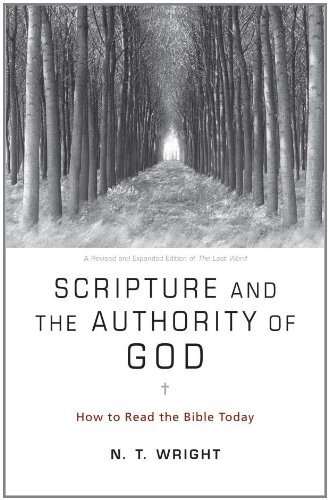Today we continue our discussion of N.T. Wright’s Scripture and The Authority of God as part of our series on learning to love the Bible for what it is, not what we want it to be.
Last week, we discussed the thesis of the book—Wright’s assertion that “the ‘authority of Scripture’ can make sense only if it is shorthand for ‘the authority of the triune God, exercised somehow through Scripture.’”
“When we take the phrase ‘the authority of Scripture’ out of its suitcase,” Wright says, “then, we recognize that it can have Christian meaning only if we are referring to scripture’s authority in a delegated or mediated sense from that which God himself possesses and that which Jesus possesses as the risen Lord and Son of God, the Immanuel.”
Makes sense to me. Let’s unpack that suitcase!
But as Chapter 1 continues, Wright starts using a word that I don’t like very much: sovereignty.
“God’s authority,” says Wright, “is his sovereign power accomplishing his renewal of all creation. Specific authority over human beings, notably the church, must be seen as part of that larger whole.”
I don’t like the word sovereignty because it’s the word that Calvinists use to explain why God predestines people for hell.
Sovereignty, in their view, refers to God’s manipulation over everything that happens in the world, from natural disasters, to war, to hunger and disease, to the rape and exploitation of children. This view, in my opinion, naturally leads to the conclusion that God is the author and perpetrator of sin, which I find unacceptable. It’s a view that has gotten me into some pretty intense debates with fellow Christians, and a view that has been known to trigger more than one crises of faith.
And so, in a sense, I have surrendered the word “sovereignty” to the Reformed camp. Sovereignty is their thing, I tell myself, not mine.
But N.T. Wright is not a Calvinist, and he seems to like the word well enough...so why shouldn’t I?
Wright uses the word “sovereign” to describe God’s purpose “not just to save human beings, but to renew the whole world.”
Anyone who has spent any time reading Wright will recognize this refrain. Understanding Christianity in the context of God’s plan to restore and renew all of creation is something of an obsession of his.
“This is the unfinished story in which readers of scripture are invited to become actors in their own right,” Wright explains ““The authority of scripture’ is thus a sub-branch of several other theological topics: the mission of the church, the work of the Spirit, the ultimate future hope and the way it is anticipated in the present, and of course the nature of the church...It is enormously important that we see the role of scripture not simply as being to provide true information about, or even an accurate running commentary upon, the work of God in salvation and new creation, but as taking an active part within that ongoing purpose.”
Revelation, he says, “is always to be understood within the category of God’s mission to the world, God’s saving sovereignty let loose through Jesus and the Spirit and aimed at the healing and renewal of all creation.”
If I understand him correctly, then, Wright invokes the word “sovereign” to describe God’s power to accomplish his purpose to redeem and restore creation through Jesus Christ. This view is invariably linked to the Kingdom message of Jesus, for as Wright notes in this brief essay, “the sovereignty of God in the New Testament is more about politics than about philosophy.”
“To speak of God’s Kingdom,” says Wright in Scripture and the Authority of God, “is thus to invoke God as the sovereign one who has the right, the duty, and the power to deal appropriately with evil in the world, in Israel, and in human beings, and thereupon to remake the world, Israel, and human beings.”
This is not the “sovereignty” of double predestination, but of Kingdom-come. It’s not about God manipulating creation like a puppeteer, but of ruling over creation, like a wise King. It’s thedifference between a God who controls and a God in control.
...at least I think it is.
I could be wrong. Wright's books have a way of making sense to me later, when I'm doing something other than reading them - like the laundry.
Both “authority” and “sovereignty” are difficult words for me...probably because the former has been used to say I have no right to teach men and the later to say I have no business worrying about folks who were predestined before their birth to spend eternity in hell. But Wright seems to see both as life-giving affirmations of God’s love for creation and his undeterred purpose of restoring all things to himself.
“Authority,” says Wright, “particularly when we locate it within the notion of God’s Kingdom is...the sovereign rule of God sweeping through creation to judge and to heal. It is the powerful love of God in Jesus Christ, putting sin to death and launching new creation. It is the fresh, bracing and energizing wind of the spirit.”
Wow. I’ve never heard anyone describe authority like that before!
I’d really love to get your thoughts on this.
How would you explain what Wright means by “sovereignty” and “authority”?
And how can we non-Calvinists engage in these important concepts without freaking out?
© 2012 All rights reserved.
Copying and republishing this article on other Web sites without written permission is prohibited.

